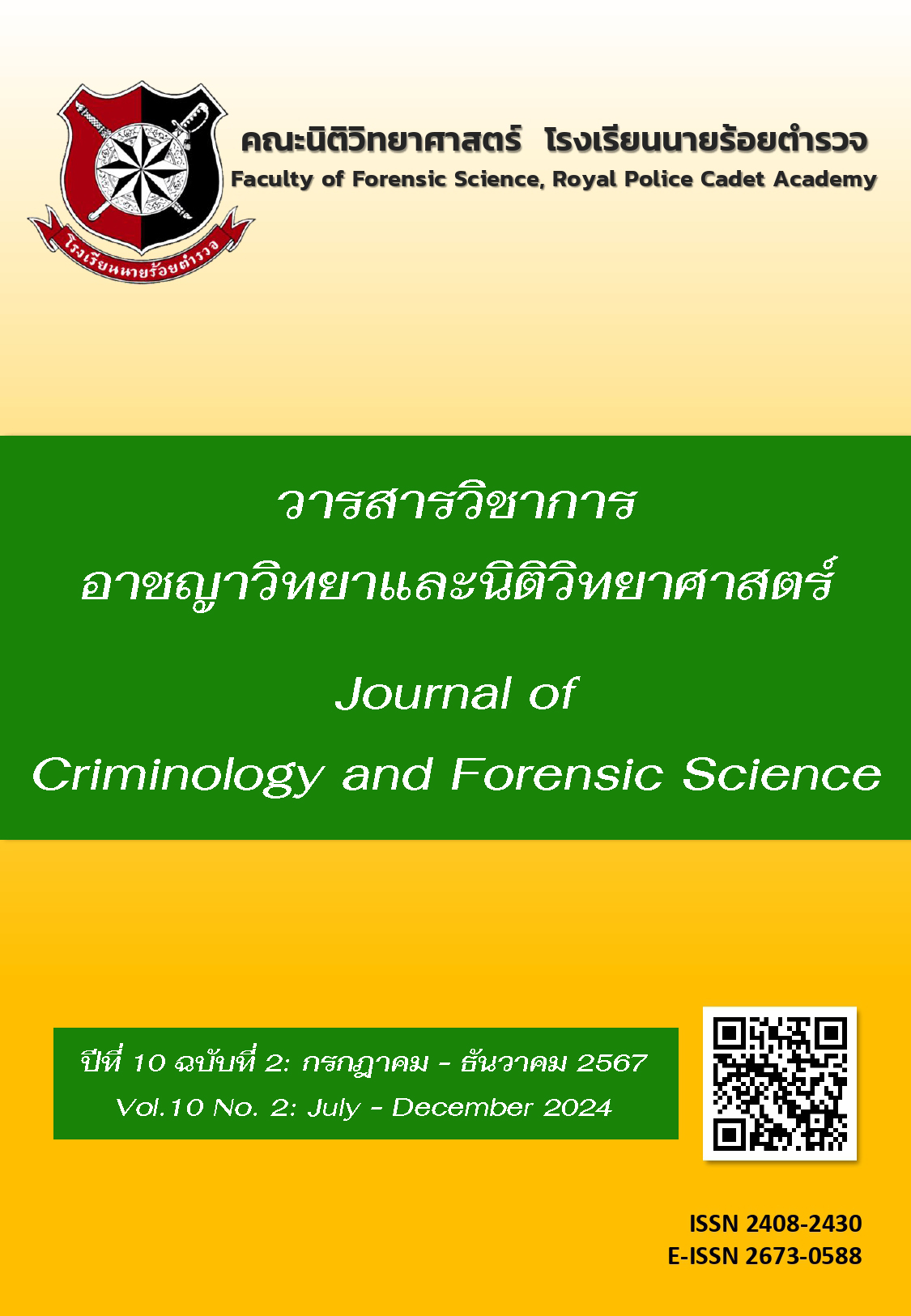การสอบสวนที่มิชอบด้วยกฎหมาย กรณีศึกษาเหตุที่ทำให้การสอบสวนเสียไปทั้งหมด
Main Article Content
บทคัดย่อ
การศึกษาวิจัยนี้ มีวัตถุประสงค์เพื่อศึกษาปัญหาและเสนอแนะแนวทางในการป้องกันปัญหา การสอบสวนโดยมิชอบ ผลการวิจัยพบว่า การสอบสวนที่บกพร่องในสาระสำคัญตามกฎหมายวิธีพิจารณาความอาญาที่ทำให้การสอบสวนไม่ชอบด้วยกฎหมาย ถือว่าคดีนั้นไม่มีการสอบสวนมาก่อน ทำให้พนักงานอัยการไม่มีอำนาจฟ้อง มีอยู่ 4 กรณี ได้แก่ 1) ผู้สอบสวนมิได้ดำรงตำแหน่งพนักงานสอบสวน 2)พนักงานสอบสวนผู้รับผิดชอบไม่ได้ดำเนินการในเขตอำนาจ 3)พนักงานสอบสวนไม่แจ้งข้อหาให้กับผู้ต้องหา และ 4) พนักงานสอบสวนมิได้มีคำร้องทุกข์ของผู้เสียหายในความผิดต่อส่วนตัว ผลกระทบต่อผู้เสียหาย ได้แก่ การการฟ้องร้องคดีใหม่ การเสียสิทธิขอให้บังคับจำเลยคืนทรัพย์สินหรือชดใช้ค่าสินไหม เป็นต้น ส่วนผลกระทบต่อผู้ต้องหา ได้แก่ การถูกดำเนินคดีซ้ำจากการกระทำความผิดเพียงครั้งเดียว ส่วนผลกระทบต่อสังคม ได้แก่ ต้นทุนทางสังคมที่ต้องทำการสอบสวนคดีใหม่ ซึ่งไม่คุ้มค่ากับประโยชน์ที่ได้รับจากการยกฟ้องเพราะเหตุข้างต้น อีกทั้งการยกฟ้องด้วยเรื่องดังกล่าวมิใช่สาเหตุที่เกิดจากความผิดพลาดบกพร่องของผู้เสียหาย ผู้ต้องหาหรือจำเลยแต่อย่างใด สำนักงานตำรวจแห่งชาติควรพิจารณาแก้ไขกฎหมาย ระเบียบ คำสั่งที่เกี่ยวข้องกับการสอบสวนคดีอาญา โดยให้หัวหน้าสถานีตำรวจต้องทำการตรวจสอบเหตุแห่งการสอบสวนไม่ชอบด้วยกฎหมายเหล่านี้อย่างเคร่งครัด ข้อเสนอเหล่านี้จะช่วยลดจำนวนคดีที่เกิดขึ้นจากการสอบสวนที่ไม่ชอบด้วยกฎหมายได้ และจะช่วยให้เกิดความเชื่อมั่นศรัทธาต่อกระบวนการยุติธรรมและตำรวจมากยิ่งขึ้น
Article Details

อนุญาตภายใต้เงื่อนไข Creative Commons Attribution-NonCommercial-NoDerivatives 4.0 International License.
เนื้อหาและข้อมูลในบทความที่ลงตีพิมพ์ใน วารสารวิชาการอาชญาวิทยาและนิติวิทยาศาสตร์ โรงเรียนนายร้อยตำรวจ ถิอว่าเป็นข้อคิดเห็นและความรั้บผิดชอบของผู้เขียนบทความโดยตรงซึ่งกองบรรณาธิการวารสาร ไม่จำเป็นต้องเห็นด้วยหรือรับผิดชอบใดๆ
บทความ ข้อมูล เนื้อหา รูปภาพ ฯลฯ ที่ได้รับการตีพิมพ์ใน วารสารวิชาการอาชญาวิทยาและนิติวิทยาศาสตร์ ถือว่าเป็นลิขสิทธิ์ของวารสาร วารสารวิชาการอาชญาวิทยาและนิติวิทยาศาสตร์ หากบุคคลหรือหน่วยงานใดต้องการนำทั้งหมดหรือส่วนหนึ่งส่วนใดไปเผยแพร่ต่อหรือเพื่อกระทำการใดๆ จะต้องได้รับอนุญาตเป็นลายลักษณ์อักษรจาก วารสารวิชาการอาชญาวิทยาและนิติวิทยาศาสตร์ ก่อนเท่านั้น
เอกสารอ้างอิง
Chakkapong Wiwatwanit. (2010). Principle and Theory of Inquiry). (4th ed.). Nonthaburi: Apisara Intergroup. (In Thai)
Chonlada Jintasatean. (2010). The exception of exclusionary rule on improperly evidence under section 226/1 of Thai Criminal Procedure Code. (Master of laws thesis). Thammasat University. (In Thai).
Isravut Onnom. (1998). The exclusionary rule. (Master of laws thesis). Dhurakij Pundit University. (In Thai).
Kanit Nanakorn. (2012). Criminal Procedure. (8th ed.). Bangkok: Winyuchon. (In Thai)
Kanit Nanakorn. (2018). Criminal Procedure. (9th ed.). Bangkok: Winyuchon. (In Thai)
Khemchai Chutiwong. (1998). Criminal Procedure. (6th ed.). Bangkok: Nitibannakan. (In Thai)
Kunthasut Arunsuda. (2020). Decisions of the supreme court involving unlawful investigations. (Master of laws thesis). Thammasat University. (In Thai).
Punlop Padchaivong. (2006). The reopening of criminal case: study on the reopening of criminal case which is detrimental to the defendant. (Master of laws thesis). Dhurakij Pundit University. (In Thai).
Sanyalux Panwattanalikit. (2009) The efficiency in the criminal procedure: studies in the pre-trial stage and trial stage. (Master of laws thesis). Thammasat University. (In Thai).
Sutida Kanchanawongse. (2007). Double jeopardy in the official’s level. (Master of laws thesis). Dhurakij Pundit University. (In Thai).
Tassanee Angsananont. (1993). Double investigation. (Master of laws thesis). Chulalongkorn University. (In Thai).
Yingphan Khamphuwiang. (2012). Jurisdictional investigation in Criminal cases. (Master of laws thesis). Thammasat University. (In Thai).


